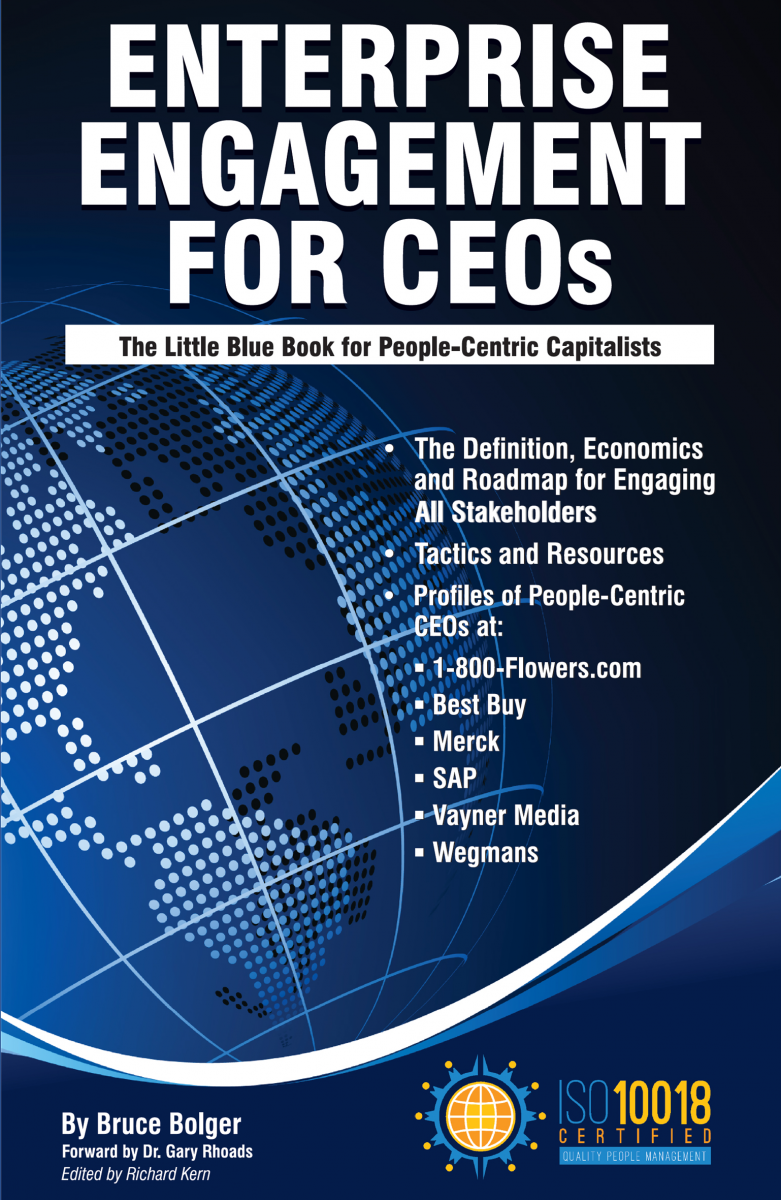NYSE-JUST Capital Webinar: Stakeholder Capitalists Just Perform Better
 “ESG (Environmental, Social, and Governance) business practices are now proven to drive better results,” says Lynn Martin, President of ICE Data Services, a leading provider of market data to investors. “2020 will go down as the year of ESG.” Investors, she says, will be increasingly looking at “public disclosures, public filings, sustainability reports, what companies put on their web sites. Our job is to provide investors objective information on a company’s ESG footprint on as a real-time basis as possible.”
“ESG (Environmental, Social, and Governance) business practices are now proven to drive better results,” says Lynn Martin, President of ICE Data Services, a leading provider of market data to investors. “2020 will go down as the year of ESG.” Investors, she says, will be increasingly looking at “public disclosures, public filings, sustainability reports, what companies put on their web sites. Our job is to provide investors objective information on a company’s ESG footprint on as a real-time basis as possible.” Paul Tudor Jones is a hedge fund investor and founder of the JUST Capital outreach group and the JUST Capital Goldman Sachs ETF (Exchange Traded Fund), which includes 500 of JUST Capital’s top companies ranked according to what surveys of Americans seek in companies. “What’s good for stakeholders is good for shareholders. These companies have a better return on equity and have the earnings to prove it.They get fined less. They are much more likely to have an inclusive workforce; they are less likely to pollute, and yet you get great company performance.” He says the JUST Capital ETF has outperformed the Russell 1000 index by about 7% per year since November 2016 and has outperformed the index by about 12% this year. Jones announced that Goldman Sachs will shortly create a JUST 100 ETF.
Paul Tudor Jones is a hedge fund investor and founder of the JUST Capital outreach group and the JUST Capital Goldman Sachs ETF (Exchange Traded Fund), which includes 500 of JUST Capital’s top companies ranked according to what surveys of Americans seek in companies. “What’s good for stakeholders is good for shareholders. These companies have a better return on equity and have the earnings to prove it.They get fined less. They are much more likely to have an inclusive workforce; they are less likely to pollute, and yet you get great company performance.” He says the JUST Capital ETF has outperformed the Russell 1000 index by about 7% per year since November 2016 and has outperformed the index by about 12% this year. Jones announced that Goldman Sachs will shortly create a JUST 100 ETF.Investing in Employees Boosts Returns
 Observes Warren Valdmanis, Partner in Two Sigma Impact, an investor in people-focused businesses, “There has been a lot of talk about ESG over the last few years. Finally, the S (Social) of ESG is getting its moment. Fair treatment of workers has become a No. 1 priority.” He believes this has a significant impact on organizational performance. “50% of Americans describe themselves as disengaged; 13% are so disengaged, they act against their employer.'s interests. This is a big drag on the economy.”
Observes Warren Valdmanis, Partner in Two Sigma Impact, an investor in people-focused businesses, “There has been a lot of talk about ESG over the last few years. Finally, the S (Social) of ESG is getting its moment. Fair treatment of workers has become a No. 1 priority.” He believes this has a significant impact on organizational performance. “50% of Americans describe themselves as disengaged; 13% are so disengaged, they act against their employer.'s interests. This is a big drag on the economy.”  From the point of view of a major institutional investor, Rodrigo Garcia, Deputy State Treasurer, Chief Investment Officer, and Chief Financial Officer, Illinois State Treasurer, says, “Companies with a sustainable business approach are lower risks. They are good for the community and good for the bottom line. This aligns with our core fiduciary responsibility.” His office uses traditional financial metrics with a focus on sustainability and corporate responsibility and believes this approach “protects shareholder value and maximizes returns.”
From the point of view of a major institutional investor, Rodrigo Garcia, Deputy State Treasurer, Chief Investment Officer, and Chief Financial Officer, Illinois State Treasurer, says, “Companies with a sustainable business approach are lower risks. They are good for the community and good for the bottom line. This aligns with our core fiduciary responsibility.” His office uses traditional financial metrics with a focus on sustainability and corporate responsibility and believes this approach “protects shareholder value and maximizes returns.” 

 Angela Santone, Senior Executive Vice President, Human Resources, AT&T, one of the companies in the JUST 500 index, says: “The future of work is here. How do we engage employees in this new world of work at home? How do we recruit, develop, reward, incent and engage people? We are thinking about this with a different lens that we have never used before. This is difficult. This is pushing us to think in innovative ways.” The company’s core principles, she says, “drive all our decisions.”
Angela Santone, Senior Executive Vice President, Human Resources, AT&T, one of the companies in the JUST 500 index, says: “The future of work is here. How do we engage employees in this new world of work at home? How do we recruit, develop, reward, incent and engage people? We are thinking about this with a different lens that we have never used before. This is difficult. This is pushing us to think in innovative ways.” The company’s core principles, she says, “drive all our decisions.”  Says Kathy Sayko, Chief Inclusion & Diversity Officer, PGIM, the global investment management company formerly known as Prudential, “Diversity will be key.” The events of this year, she explains, have created an inflexion point in people’s awareness from which there is no going back.
Says Kathy Sayko, Chief Inclusion & Diversity Officer, PGIM, the global investment management company formerly known as Prudential, “Diversity will be key.” The events of this year, she explains, have created an inflexion point in people’s awareness from which there is no going back. Master the Principles of Stakeholder Capitalism And Implementation Through Enterprise Engagement

This is the definitive implementation guide to Stakeholder Capitalism, written specifically to provide CEOs and their leadership teams a concise overview of the framework, economics, and implementation process of a CEO-led strategic and systematic approach to achieving success through people. (123 pages, $15.99)

The first and most comprehensive book on Enterprise Engagement and the new ISO 9001 and ISO 10018 quality people management standards. Includes 36 chapters detailing how to better integrate and align engagement efforts across the enterprise. (312 pages, $36.)
OTHER RESOURCES TO ACTUALIZE STAKEHOLDER CAPITALISM
Communities: The Enterprise Engagement Alliance and Advocate and the Brand Media Coalition free resource centers offering access to the latest research, news, and case studies; discounts, promotions, referrals, and commissions, when appropriate to third-party solution providers from participating coalition solution provider members.
Online Overview:
10-minute short course: click here for a 10-minute introduction to Enterprise Engagement and ISO standards from the Coggno.com learning platform.
Services:
• The Engagement Agency at EngagementAgency.net, offering: complete support services for employers, solution providers, and technology firms seeking to profit from formal engagement practices for themselves or their clients, including Brand and Capability audits for solution providers to make sure their products and services are up to date.
• C-Suite Advisory Service—Education of boards, investors, and C-suite executives on the economics, framework, and implementation processes of Enterprise Engagement.
• Speakers Bureau—Select the right speaker on any aspect of engagement for your next event.
• Mergers and Acquisitions. The Engagement Agency’s Mergers and Acquisition group is aware of multiple companies seeking to purchase firms in the engagement field. Contact Michael Mazer in confidence if your company is potentially for sale at 303-320-3777.
Enterprise Engagement Benchmark Tools: The Enterprise Engagement Alliance offers three tools to help organizations profit from Engagement. Click here to access the tools.
• ROI of Engagement Calculator. Use this tool to determine the potential return-on-investment of an engagement strategy.
• EE Benchmark Indicator. Confidentially benchmark your organization’s Enterprise Engagement practices against organizations and best practices.
• Compare Your Company’s Level of Engagement. Quickly compare your organization’s level of engagement to those of others based on the same criteria as the EEA’s Engaged Company Stock Index.
• Gauge Your Personal Level of Engagement. This survey, donated by Horsepower, enables individuals to gauge their own personal levels of engagement.
For more information, contact Bruce Bolger at Bolger@TheEEA.org, 914-591-7600, ext. 230.














